英语常见口语的用法
- 格式:doc
- 大小:34.50 KB
- 文档页数:3
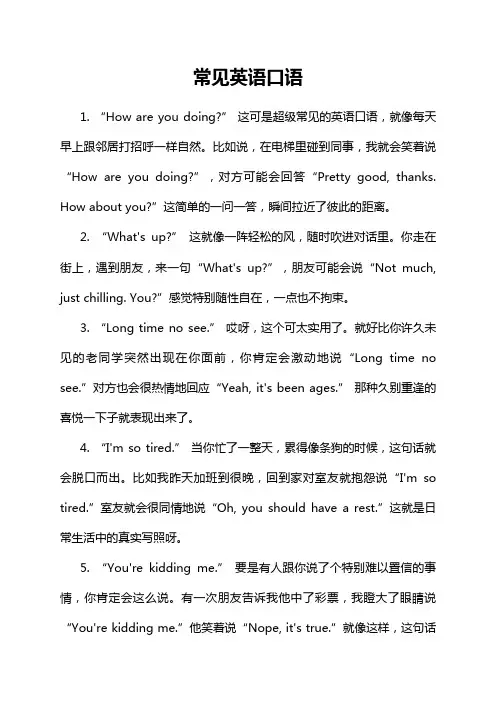
常见英语口语1. “How are you doing?” 这可是超级常见的英语口语,就像每天早上跟邻居打招呼一样自然。
比如说,在电梯里碰到同事,我就会笑着说“How are you doing?”,对方可能会回答“Pretty good, thanks. How about you?”这简单的一问一答,瞬间拉近了彼此的距离。
2. “What's up?” 这就像一阵轻松的风,随时吹进对话里。
你走在街上,遇到朋友,来一句“What's up?”,朋友可能会说“Not much, just chillin g. You?”感觉特别随性自在,一点也不拘束。
3. “Long time no see.” 哎呀,这个可太实用了。
就好比你许久未见的老同学突然出现在你面前,你肯定会激动地说“Long time no see.”对方也会很热情地回应“Yeah, it's been ages.” 那种久别重逢的喜悦一下子就表现出来了。
4. “I'm so tired.” 当你忙了一整天,累得像条狗的时候,这句话就会脱口而出。
比如我昨天加班到很晚,回到家对室友就抱怨说“I'm so tired.”室友就会很同情地说“Oh,you should have a rest.”这就是日常生活中的真实写照呀。
5. “You're kidding me.” 要是有人跟你说了个特别难以置信的事情,你肯定会这么说。
有一次朋友告诉我他中了彩票,我瞪大了眼睛说“You're kidding me.”他笑着说“Nope, it's true.”就像这样,这句话能很好地表达出你的惊讶。
6. “It's a piece of cake.” 形容事情简单的时候,这个短语超级好用。
我在教弟弟做数学题,他觉得很难,我看了一眼说“It's a piece of cake.”然后轻松地给他讲解了步骤,他马上就懂了,就像把一块小蛋糕轻松送入口中那么简单。
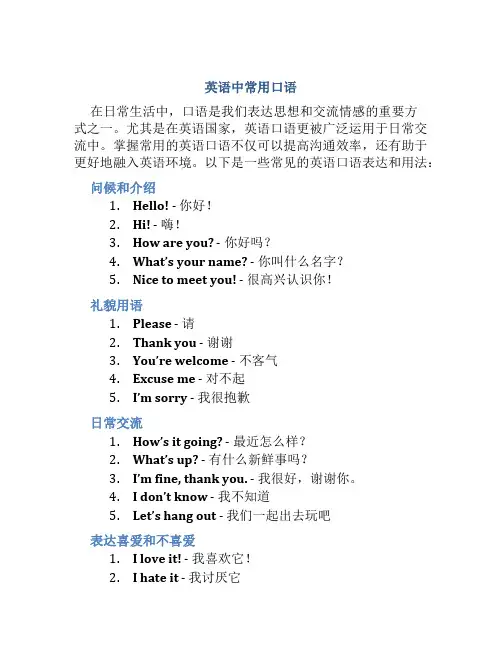
英语中常用口语在日常生活中,口语是我们表达思想和交流情感的重要方式之一。
尤其是在英语国家,英语口语更被广泛运用于日常交流中。
掌握常用的英语口语不仅可以提高沟通效率,还有助于更好地融入英语环境。
以下是一些常见的英语口语表达和用法:问候和介绍1.Hello! - 你好!2.Hi! - 嗨!3.How are you? - 你好吗?4.What’s your name? - 你叫什么名字?5.Nice to meet you! - 很高兴认识你!礼貌用语1.Please - 请2.Thank you - 谢谢3.You’re welcome - 不客气4.Excuse me - 对不起5.I’m sorry - 我很抱歉日常交流1.How’s it going? - 最近怎么样?2.What’s up? - 有什么新鲜事吗?3.I’m fine, thank you. - 我很好,谢谢你。
4.I don’t know - 我不知道5.Let’s hang out - 我们一起出去玩吧表达喜爱和不喜爱1.I love it! - 我喜欢它!2.I hate it - 我讨厌它3.It’s amazing! - 真是太棒了!4.It’s terrible - 真糟糕请求和邀请1.Could you please pass me the salt? - 请把盐递给我好吗?2.Let’s go to the movies - 我们去看电影吧3.Can you give me a hand? - 你可以帮我一下吗?4.Do you want to grab a bite? - 你想一起吃点东西吗?表达情感1.I’m so happy - 我好开心2.I’m bored - 我很无聊3.I’m confused - 我很困惑4.I am excited - 我很兴奋5.I am scared - 我很害怕以上是一些日常生活中常用的英语口语表达,希望对提升你的口语交流能力有所帮助!。
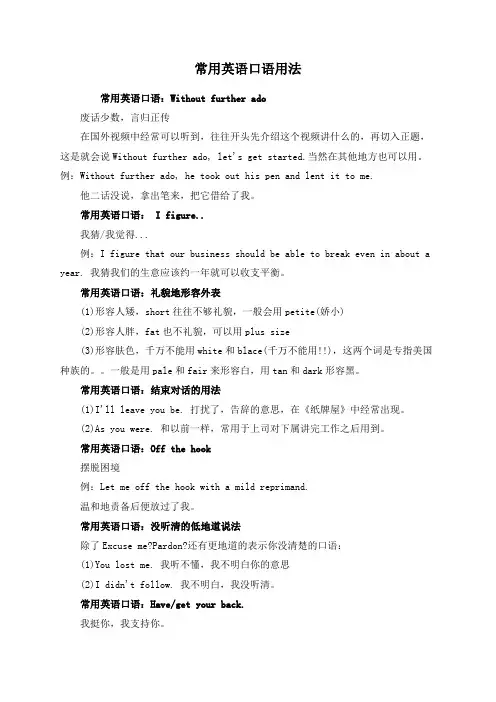
常用英语口语用法常用英语口语:Without further ado废话少数,言归正传在国外视频中经常可以听到,往往开头先介绍这个视频讲什么的,再切入正题,这是就会说Without further ado, let's get started.当然在其他地方也可以用。
例:Without further ado, he took out his pen and lent it to me.他二话没说,拿出笔来,把它借给了我。
常用英语口语: I figure..我猜/我觉得...例:I figure that our business should be able to break even in about a year. 我猜我们的生意应该约一年就可以收支平衡。
常用英语口语:礼貌地形容外表(1)形容人矮,short往往不够礼貌,一般会用petite(娇小)(2)形容人胖,fat也不礼貌,可以用plus size(3)形容肤色,千万不能用white和blace(千万不能用!!),这两个词是专指美国种族的。
一般是用pale和fair来形容白,用tan和dark形容黑。
常用英语口语:结束对话的用法(1)I'll leave you be. 打扰了,告辞的意思,在《纸牌屋》中经常出现。
(2)As you were. 和以前一样,常用于上司对下属讲完工作之后用到。
常用英语口语:Off the hook摆脱困境例:Let me off the hook with a mild reprimand.温和地责备后便放过了我。
常用英语口语:没听清的低地道说法除了Excuse me?Pardon?还有更地道的表示你没清楚的口语:(1)You lost me. 我听不懂,我不明白你的意思(2)I didn't follow. 我不明白,我没听清。
常用英语口语:Have/get your back.我挺你,我支持你。

英语口语常用句式及例句汇总我可以……吗?常用句子:May I XXX?我可以进来吗?May I help you?您需要帮忙吗?May I ask you a n?我可以问你一个问题吗?搭配:接动词原型。
例句:May I speak to Vincent?请问XXX在吗?May I use your telephone?我可以借用你的电话吗?May I have a seat?我可以坐下吗?功能:用这些话显得很有教养。
2.Can you …?你能……吗?常用句子:Can you help me?你能帮帮我吗?Can you do me a favor?你能帮我个忙吗?Can you please tell me where is the bus。
你能告诉我公共汽车站怎么走吗?搭配:接动词原型。
例句:Can you please shut the door?你能把门关上吗?Can you translate the sentence into Chinese forme?你能帮我把这个句子翻译成中文吗?Can you lend me some money?你能借我点钱吗?功能:用于比较熟悉的人之间,会让对方感觉亲切。
假如想再客气一点,能够把can换成could。
3.I’d like to …我想……常用句子:I’d like to have a n.我想作个毛遂自荐。
I’d like to talk about the matter.我想谈谈那件事。
I’d like to have a cup of tea.我想喝杯茶。
搭配:加动词原型。
例句:I’d like to book a double-room.我想订一间双人房。
I’d like to change the topic.我想换个话题。
I’d like to have my car repaired.我想请人帮我把汽车修睦。
功用:用于表达志愿或发起,任何时分都显得言语得体。
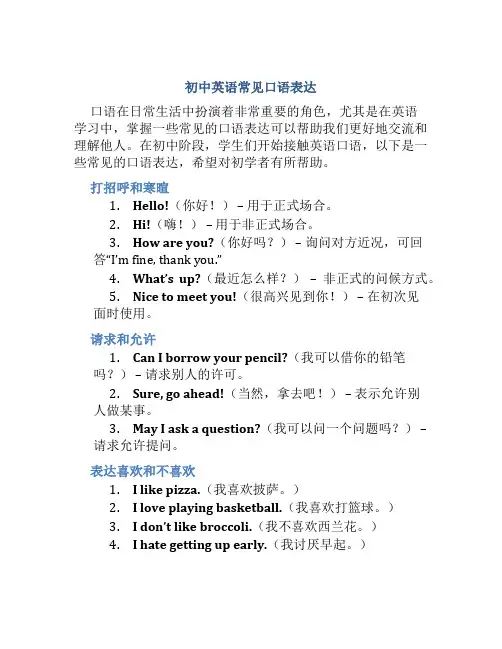
初中英语常见口语表达口语在日常生活中扮演着非常重要的角色,尤其是在英语学习中,掌握一些常见的口语表达可以帮助我们更好地交流和理解他人。
在初中阶段,学生们开始接触英语口语,以下是一些常见的口语表达,希望对初学者有所帮助。
打招呼和寒暄1.Hello!(你好!)–用于正式场合。
2.Hi!(嗨!)–用于非正式场合。
3.How are you?(你好吗?)–询问对方近况,可回答“I’m fine, thank you.”4.What’s up?(最近怎么样?)–非正式的问候方式。
5.Nice to meet you!(很高兴见到你!)–在初次见面时使用。
请求和允许1.Can I borrow your pencil?(我可以借你的铅笔吗?)–请求别人的许可。
2.Sure, go ahead!(当然,拿去吧!)–表示允许别人做某事。
3.May I ask a question?(我可以问一个问题吗?)–请求允许提问。
表达喜欢和不喜欢1.I like pizza.(我喜欢披萨。
)2.I love playing basketball.(我喜欢打篮球。
)3.I don’t like broccoli.(我不喜欢西兰花。
)4.I hate getting up early.(我讨厌早起。
)表达时间和频率1.What time is it?(现在几点了?)2.I usually go to bed at 10 o’clock.(我通常10点钟睡觉。
)3.I never eat breakfast.(我从不吃早餐。
)4.He sometimes goes swimming on weekends.(他有时候周末去游泳。
)表达喜悦和失望1.I’m so happy!(我好高兴!)2.What a pity!(真遗憾!或可用What a shame!)结尾礼貌用语1.Thank you!(谢谢你!)2.Please(请)3.Excuse me(对不起)–用于打断别人或向别人道歉。
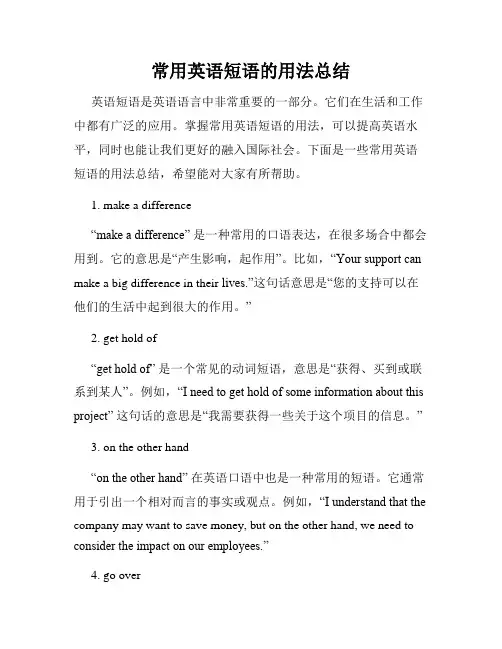
常用英语短语的用法总结英语短语是英语语言中非常重要的一部分。
它们在生活和工作中都有广泛的应用。
掌握常用英语短语的用法,可以提高英语水平,同时也能让我们更好的融入国际社会。
下面是一些常用英语短语的用法总结,希望能对大家有所帮助。
1. make a difference“make a difference” 是一种常用的口语表达,在很多场合中都会用到。
它的意思是“产生影响,起作用”。
比如,“Your support can make a big difference in their lives.”这句话意思是“您的支持可以在他们的生活中起到很大的作用。
”2. get hold of“get hold of” 是一个常见的动词短语,意思是“获得、买到或联系到某人”。
例如,“I need to get hold of some information about this project” 这句话的意思是“我需要获得一些关于这个项目的信息。
”3. on the other hand“on the other hand” 在英语口语中也是一种常用的短语。
它通常用于引出一个相对而言的事实或观点。
例如,“I understand that the company may want to save money, but on the other hand, we need to consider the impact on our employees.”4. go over“go over” 是一个常用的动词短语,意思是“检查,复习”。
例如,“Before you submit the report, please go over it one more time to make sur e there are no mistakes.”5. by the way“by the way” 是一种常见的短语,在口语和书面语中都可以使用。
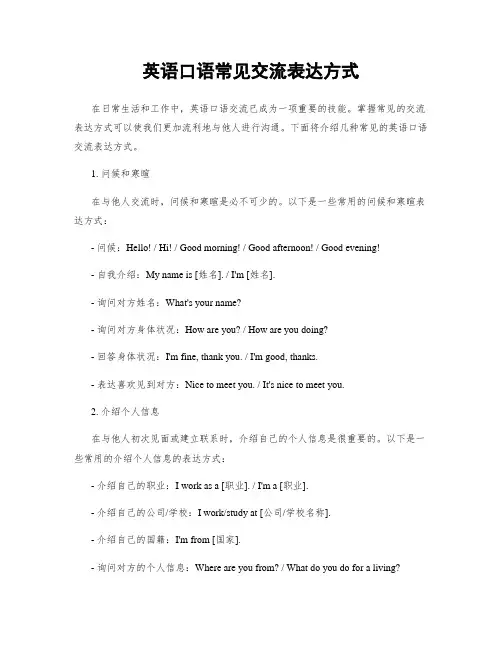
英语口语常见交流表达方式在日常生活和工作中,英语口语交流已成为一项重要的技能。
掌握常见的交流表达方式可以使我们更加流利地与他人进行沟通。
下面将介绍几种常见的英语口语交流表达方式。
1. 问候和寒暄在与他人交流时,问候和寒暄是必不可少的。
以下是一些常用的问候和寒暄表达方式:- 问候:Hello! / Hi! / Good morning! / Good afternoon! / Good evening!- 自我介绍:My name is [姓名]. / I'm [姓名].- 询问对方姓名:What's your name?- 询问对方身体状况:How are you? / How are you doing?- 回答身体状况:I'm fine, thank you. / I'm good, thanks.- 表达喜欢见到对方:Nice to meet you. / It's nice to meet you.2. 介绍个人信息在与他人初次见面或建立联系时,介绍自己的个人信息是很重要的。
以下是一些常用的介绍个人信息的表达方式:- 介绍自己的职业:I work as a [职业]. / I'm a [职业].- 介绍自己的公司/学校:I work/study at [公司/学校名称].- 介绍自己的国籍:I'm from [国家].- 询问对方的个人信息:Where are you from? / What do you do for a living?- 回答对方的问题:I'm from [国家]. / I work as a [职业].3. 询问和提供帮助在与他人的交流中,提供或寻求帮助是常见的交流情境。
以下是一些常用的询问和提供帮助的表达方式:- 询问是否需要帮助:Can I help you with anything? / Is there anything I can do for you?- 请求他人帮助:Could you please help me with [任务]? / Would you mind [请求]?- 表达感谢:Thank you for your help. / I really appreciate it.4. 提出建议和意见在讨论问题或解决困难时,提出建议和意见是非常重要的。

英语口语常用句式集团标准化办公室:[VV986T-J682P28-JP266L8-68PNN]1.M a y I…我可以……吗?常用句子:May I come in?我可以进来吗?May I help you?您需要帮忙吗?May I ask you a question?我可以问你一个问题吗?搭配:接动词原型。
例句:May I speak to Vincent?请问文森在吗?May I use your telephone?我可以借用你的电话吗?May I have a seat?我可以坐下吗?功能: 用这些话显得很有教养。
2. Can you …你能……吗?常用句子:Can you help me?你能帮帮我吗?Can you do me a favor?你能帮我个忙吗?Can you please tell me where is the bus stop?你能告诉我公共汽车站怎么走吗?搭配:接动词原型。
例句:Can you please shut the door?你能把门关上吗?Can you translate the sentence into Chinese for me?你能帮我把这个句子翻译成中文吗?Can you lend me some money?你能借我点钱吗?功能:用于比较熟悉的人之间,会让对方感觉亲切。
如果想再客气一点,可以把can换成could。
3. I’d like to …我想……常用句子:I’d like to have a self-introduction.我想作个自我介绍。
I’d like to talk about the matter.我想谈谈那件事。
I’d like to have a cup of tea.我想喝杯茶。
搭配:加动词原型。
例句:I’d like to book a double-room.我想订一间双人房。
I’d like to change the topic.我想换个话题。
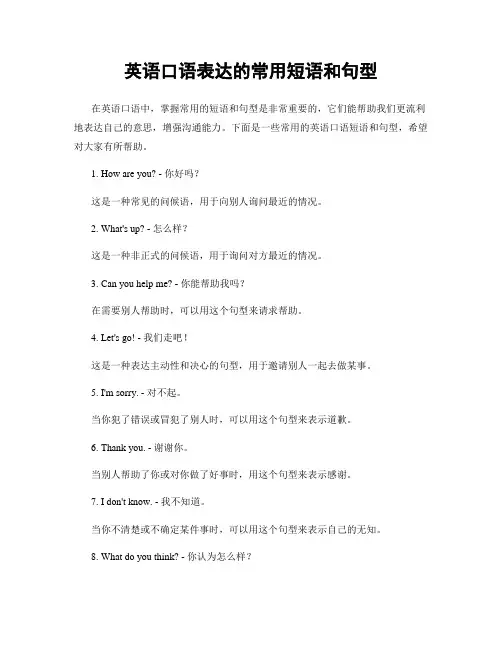
英语口语表达的常用短语和句型在英语口语中,掌握常用的短语和句型是非常重要的,它们能帮助我们更流利地表达自己的意思,增强沟通能力。
下面是一些常用的英语口语短语和句型,希望对大家有所帮助。
1. How are you? - 你好吗?这是一种常见的问候语,用于向别人询问最近的情况。
2. What's up? - 怎么样?这是一种非正式的问候语,用于询问对方最近的情况。
3. Can you help me? - 你能帮助我吗?在需要别人帮助时,可以用这个句型来请求帮助。
4. Let's go! - 我们走吧!这是一种表达主动性和决心的句型,用于邀请别人一起去做某事。
5. I'm sorry. - 对不起。
当你犯了错误或冒犯了别人时,可以用这个句型来表示道歉。
6. Thank you. - 谢谢你。
当别人帮助了你或对你做了好事时,用这个句型来表示感谢。
7. I don't know. - 我不知道。
当你不清楚或不确定某件事时,可以用这个句型来表示自己的无知。
8. What do you think? - 你认为怎么样?当你想征求对方的意见或想知道他们的想法时,可以用这个句型来提问。
9. It's not my fault. - 不是我的错。
当别人责备你或认为你犯了错误时,可以用这个句型来辩解。
10. I agree. - 我同意。
当你同意别人的观点或建议时,可以用这个句型来表示你的同意。
11. I disagree. - 我不同意。
当你不同意别人的观点或建议时,可以用这个句型来表示你的异议。
12. I'm sorry, I didn't catch that. - 对不起,我没听清楚。
当你没有听清对方说什么时,可以用这个句型来请求对方再次重复。
13. Can you speak slower, please? - 请慢点说话好吗?当对方说话速度太快时,可以用这个句型请求对方慢点说。
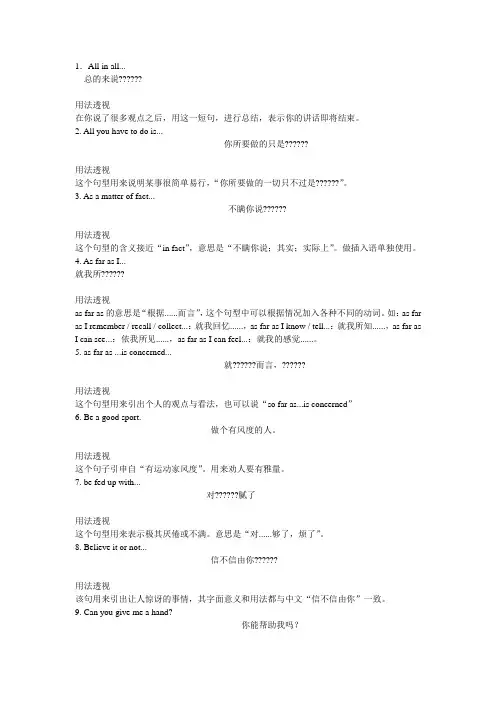
1.All in all...总的来说??????用法透视在你说了很多观点之后,用这一短句,进行总结,表示你的讲话即将结束。
2. All you have to do is...你所要做的只是??????用法透视这个句型用来说明某事很简单易行,“你所要做的一切只不过是??????”。
3. As a matter of fact...不瞒你说??????用法透视这个句型的含义接近“in fact”,意思是“不瞒你说;其实;实际上”。
做插入语单独使用。
4. As far as I...就我所??????用法透视as far as的意思是“根据......而言”,这个句型中可以根据情况加入各种不同的动词。
如:as far as I remember / recall / collect...:就我回忆......,as far as I know / tell...:就我所知......,as far asI can see...:依我所见......,as far as I can feel...:就我的感觉......。
5. as far as ...is concerned...就??????而言,??????用法透视这个句型用来引出个人的观点与看法,也可以说“so far as...is concerned”6. Be a good sport.做个有风度的人。
用法透视这个句子引申自“有运动家风度”。
用来劝人要有雅量。
7. be fed up with...对??????腻了用法透视这个句型用来表示极其厌倦或不满。
意思是“对......够了,烦了”。
8. Believe it or not...信不信由你??????用法透视该句用来引出让人惊讶的事情,其字面意义和用法都与中文“信不信由你”一致。
9. Can you give me a hand?你能帮助我吗?用法透视“give a hand”的意思是“出手帮忙”,这个句型可用来要求帮助。
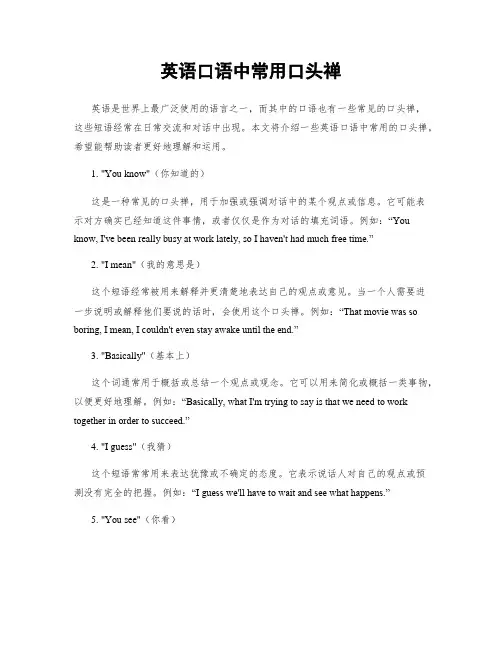
英语口语中常用口头禅英语是世界上最广泛使用的语言之一,而其中的口语也有一些常见的口头禅,这些短语经常在日常交流和对话中出现。
本文将介绍一些英语口语中常用的口头禅,希望能帮助读者更好地理解和运用。
1. "You know"(你知道的)这是一种常见的口头禅,用于加强或强调对话中的某个观点或信息。
它可能表示对方确实已经知道这件事情,或者仅仅是作为对话的填充词语。
例如:“You know, I've been really busy at work lately, so I haven't had much free time.”2. "I mean"(我的意思是)这个短语经常被用来解释并更清楚地表达自己的观点或意见。
当一个人需要进一步说明或解释他们要说的话时,会使用这个口头禅。
例如:“That movie was so boring, I mean, I couldn't even stay awake until the end.”3. "Basically"(基本上)这个词通常用于概括或总结一个观点或观念。
它可以用来简化或概括一类事物,以便更好地理解。
例如:“Basically, what I'm trying to say is that we need to work together in order to succeed.”4. "I guess"(我猜)这个短语常常用来表达犹豫或不确定的态度。
它表示说话人对自己的观点或预测没有完全的把握。
例如:“I guess we'll have to wait and see what happens.”5. "You see"(你看)这是一种常用的口头禅,用于引起对方的注意或解释对话中的某个观点。
它可以用来解释复杂的问题或提供更多的背景信息。
英语口语中常用的表达作为一种全球通用的语言,英语在日常生活中扮演着重要的角色。
无论是在学术环境中,商业场合中,还是在旅行中,掌握几个常用的口语表达都是非常有帮助的。
在这篇文章中,我将分享一些常见的英语口语表达,希望能对大家的英语口语水平提供帮助。
1. 问候和介绍在社交场合中,我们常常需要问候他人或者介绍自己。
以下是一些常见的表达方式:- "Hello!"(你好!)是最基本的问候方式,适用于几乎所有场合。
- "Nice to meet you!"(很高兴见到你!)是在初次见面时用来表达对对方的认识的高兴之情。
- "How are you?"(你好吗?)是一种用来询问对方近况的礼貌方式。
- "What's your name?"(你叫什么名字?)用于询问对方姓名。
- "This is (name)."(这是某人)是一种介绍某人给其他人的简洁方式。
2. 谢谢和道歉在与他人交流时,礼貌地表达谢意和道歉是至关重要的。
以下是一些常见的表达方式:- "Thank you!"(谢谢!)是表达感谢之情的最基本方式。
- "I'm sorry."(对不起。
)是表示歉意或道歉的常用短语。
- "Excuse me."(请原谅。
)用于在特殊情况下请求对方的谅解或宽容。
3. 表达愿望和意愿在日常生活中,我们常常需要表达自己的愿望和意愿。
以下是一些常见的表达方式:- "I would like..."(我想要……)用于表达自己的愿望或请求。
- "I want..."(我想要……)是直接表达自己需求的方式。
- "I hope..."(我希望……)用于表达对未来发展的期望和希望。
- "I wish..."(我希望……)是表达对过去或现在不可能实现的愿望的方式。
英语口语常用口头禅在英语交流中,口头禅是一种常见的用语表达方式,用来表示特定的情感、态度或回应。
这些常用口头禅能够增加交流的流畅性和自然性,并且能够提升与他人之间的亲近感。
以下是一些常见的英语口头禅,它们广泛应用于日常对话中,让我们一起来了解并学习如何使用它们。
1. "Well, you know"(嗯,你知道的)这是一种常见的口头禅,用来引入观点或解释事实。
它表示说话人认为对方应该是知道的或是理所当然的。
这个短语的使用类似于中文的“嗯,你知道的”,它可以帮助我们引起对方的共鸣并传达我们的观点。
例句:A: Do you think we should go to the park this weekend?B: Well, you know, the weather forecast says it's going to rain, so maybe we should reconsider.2. "Oh, my goodness!"(天呐!)这是一种用来表达惊讶、愤怒或困惑的常用口头禅。
它常常用于面对意想不到的情况或听到令人震惊的消息时。
这个短语可以帮助我们表达强烈的情感,让对话更生动有趣。
例句:A: Guess what? I just won the lottery!B: Oh, my goodness! That's amazing! Congratulations!3. "It's not a big deal"(没什么大不了的)当别人因为某件小事而感到惊讶或烦恼时,我们可以使用这个短语来表示事情并不重要,以此来安慰对方。
使用这个口头禅可以表达我们的理解和宽容,并缓解紧张的气氛。
例句:A: I can't find my keys and I'm going to be late for work!B: Relax, it's not a big deal. We'll find them together.4. "I'm just kidding"(我开玩笑的)当我们说了一句可能会引起误解或引起他人不悦的话时,可以使用这个口头禅来表明我们只是在开玩笑,以此来减轻对方的不适。
英语口语中常用单词
英语是作为一种全球通用语言的使用频率非常高的语种之一,不管是在日常生活中还是在工作学习中,我们都会接触到英语。
其中,口语是使用频率最高的形式之一。
在英语口语中,有一些常用的单词,它们可以说是我们在交流中的基本词汇。
下面将介绍一些英语口语中常用的单词及其基本意思和用法:
Hello
常见于打招呼和问候中,表示“你好”。
Goodbye
常见于离别时使用,表示“再见”。
Thank you
常见于表达感谢之情形,表示“谢谢你”。
Yes
表示同意或回答“是”。
No
表示不同意或回答“否”。
Love
表示爱的情感,常用于表达对家人、朋友或物品的喜爱。
Sorry
用于道歉和表达抱歉之情,表示“抱歉”。
Help
表示请求帮助或援助,希望得到别人的支持或协助。
Want
表示愿望或需要,表达自己的需求。
Happy
表达快乐、高兴的情绪,表示自己的喜悦之情。
以上是一些英语口语中常用的单词,它们是我们日常生活中最基本的交流工具。
通过熟练掌握这些单词的用法,我们可以更加流利地进行英语口语交流,让我们的沟通更加顺畅和准确。
希望大家能够通过不断的练习和学习,提高自己的口语表达能力,更好地适应英语环境。
【导语】每天了解⼀个初级英语⼝语句型,可以通过实际例⼦帮助理解英语,还可以通过听⼒加强记忆,通过⾳频纠正发⾳。
学习英语⼝语要从初级开始,从基础抓起。
以下是⽆忧考整理的⼊门英语⼝语的常见句⼦,欢迎阅读!1.⼊门英语⼝语的常见句⼦ You got it! 你总算明⽩了。
⼀、⽤法 这句话可以使⽤的场合很多,意思也就很多。
中⼼含义就是“我说的就是这个意思,你明⽩了。
” ⼆、范例 1. That's what I mean. You got it. 我就是这个意思,你明⽩了。
2. You mean he won't come? Yeah, you got it. 你是说他不来了?是,我就是这个意思。
3. This is the last train to Beijing? You got it. 这是去北京的末班车了吗?是。
三、对话 A: Do you mind if I come over to use your computer? 如果我到你家来⽤你的电脑,你介意吗? B: No, but I have to type my paper tonight. 不,可是我今天晚上要打我的论⽂。
A: Does that mean I can't use it tonight? 你的意思是我今天晚上不能⽤你的电脑了? B: You got it! 你总算明⽩了。
2.⼊门英语⼝语的常见句⼦ What's your favorite...? 你最喜爱的……是什么? ⼀、⽤法 ⽤来询问对⽅最喜爱的⼈或物是什么。
问⼈⽤"who",问物⽤"what""which"。
⼆、范例 1. What's your favorite dish? 你最喜爱的⼀道菜是什么? 2. Who's your favorite film star? 你最喜爱的电影明星是谁? 三、对话 A: I love ice cream. 我爱吃冰激凌。
英语交流中常用的口语表达在如今全球化的社会中,英语已成为一种重要的交流工具。
无论是商务会谈、旅行还是日常生活中,我们都需要使用英语进行交流。
为了更好地与外国人交流,掌握一些常用的英语口语表达是非常有必要的。
本文将为大家介绍一些常用的英语口语表达,帮助大家提高英语口语交流能力。
1. Greetings and Introductions(问候与介绍)在英语交流中,问候和介绍是最基本的部分。
以下是一些常用的问候和介绍的口语表达:- Hello!(你好!)- Hi, how are you?(嗨,你好吗?)- Nice to meet you!(很高兴认识你!)- What's your name?(你叫什么名字?)- My name is...(我的名字是...)- Where are you from?(你来自哪里?)- I'm from...(我来自...)2. Expressing Opinions(表达观点)在交流中,我们经常需要表达自己的观点。
以下是一些常用的表达观点的口语表达:- I think...(我认为...)- In my opinion...(在我看来...)- Personally, I believe that...(就我个人而言,我认为...)- From my point of view...(从我的角度来看...)- It seems to me that...(在我看来似乎...)- I agree/disagree with you.(我同意/不同意你的观点。
)3. Making Requests(提出请求)在交流中,我们有时需要向他人提出请求。
以下是一些常用的提出请求的口语表达:- Can you help me, please?(请你帮个忙好吗?)- Could you please...?(你能请...吗?)- Would you mind...?(你介意...吗?)- I was wondering if you could...(我想知道你是否能...)- Is it possible for you to...?(你能...吗?)4. Offering Help(提供帮助)在交流中,我们也常常需要提供帮助。
英语口语的常用日常表达英语口语在日常生活中起到非常重要的作用,它不仅能够帮助我们与外国人进行交流,还能够扩展我们的语言能力和文化视野。
下面是一些常用的英语口语日常表达,希望能对大家有所帮助。
1. 问候和道别在日常生活中,问候和道别是非常常见的表达方式。
当和别人见面时,你可以使用以下表达来问候对方:- Good morning/afternoon/evening!(早上好/下午好/晚上好!)- How are you?(你好吗?)- What's up?(最近怎么样?)- How have you been?(你过得怎么样?)当和别人分别时,你可以使用以下表达道别:- Goodbye!(再见!)- See you later!(待会见!)- Take care!(保重!)- Have a nice day!(祝你有美好的一天!)2. 打招呼和自我介绍在与他人交流时,打招呼和自我介绍是必不可少的。
以下是一些常用的表达方式:- Hi!My name is [your name]. Nice to meet you.(嗨!我叫[你的名字]。
很高兴认识你。
)- Hello!I'm [your name]. It's a pleasure to meet you.(你好!我是[你的名字]。
很高兴见到你。
)- Hey!I don't think we've met before. I'm [your name].(嘿!我觉得我们之前没有见过面。
我是[你的名字]。
)3. 提询和回答问题在与他人交流中,提询和回答问题是非常重要的口头表达形式。
以下是一些常见的问问题的表达方式:- What is your favorite food?(你最喜欢的食物是什么?)- Where do you live?(你住在哪里?)- How do you usually commute to work?(你通常怎么上班?)- Do you have any siblings?(你有兄弟姐妹吗?)当回答问题时,我们可以使用以下表达方式:- My favorite food is pizza.(我最喜欢的食物是披萨。
Common oral English1Excuse mea) used when you want to get someone's attention politely, especially when you want to ask a question: Excuse me, can you tell me the way to the museum please? 劳驾b) used to say that you are sorry for doing something rude or embarrassing:Oh, excuse me. I didn't know anyone was here. 请原谅c) used to ask someone politely to move so that you can walk past:Excuse me, could I just squeeze past?请让让d) used to politely tell someone that you are leaving a place:Excuse me a moment. I'll be right back. 请稍等e) used when you disagree with someone but want to be polite about it synonym I'm sorry:Excuse me, but I don't think that's what he meant at all. 不好意思f) American English used to show that you disagree with someone or are very surprised or upset by what they have just said: 'You're going to pay, right?' 'Excuse me?'g) especially American English used to ask someone to repeat something that they have just said (synonym pardon me:)请再说一遍,好吗?'What time is it?' 'Excuse me?' 'I asked you what time it is.'2come on!a) used to tell someone to hurry:Come on, we'll be late! 快点!b) used to encourage someone to do something:Come on, you can do it!Come on, cheer up! 加油!c) used to tell someone that you know that what they have just said was not true or right:Oh come on, don't lie!好了好了,d) used to make someone angry enough to want to fight you:Come on, then, hit me! 来呀3 that's righta) used to agree with what someone says or to answer 'yes' to a question:'I gather you work in the sales department?' 'That's right.''Some people find it very difficult to work quickly.' 'That's right, and they often find exams very stressful.'b) used when you are telling someone that you are angry about what they are doing:That's right! Just blame me for everything, as usual!4 go aheada) spoken used to tell someone they can do something:'Can I have the sports section?' 'Yeah, go ahead, I've read it.'b) to do something that was planned, especially in spite of a problemgo ahead withFrank'll be late but we'll go ahead with the meeting anyway.c) to take place:Tests of anti-cancer drugs are to go ahead this year.5 All right:1. 'What's the food like?' 'It's all right, but the place on campus is better.'(satisfactory, but not excellent)=okay2. not ill, hurt, or upset or not having any problems (no problems) Are you feeling all right? =okTony was worried about the meeting but it went all right (=happened with no problems).3. used to say whether something is suitable or convenient: Is Thursday morning all right with you?=ok4. it's all right= used to make someone feel less afraid or worried: It's all right, Mommy's here.it's/that's all right= used to reply to someone who thanks you or says they are sorry about something: 'Thanks for all your help!' 'That's quite all right.'5. used to ask or give permission for something: Would it be all right if I left early?=ok6. used to agree with someone's suggestion, although you may be slightly unwilling'Why not come along?' 'Oh, all right.'ed to check that someone understands what you have said, or to show that you understand =okI'll leave a key with the neighbours, all right? 'The train leaves at 5.30.' 'All right, I'm coming!'ed as a greeting when you meet someone you know well, or reply to a greeting'How are you, John?' 'Oh, all right - can't complain.'ed to introduce a new subject or to end a conversation All right, now I'd like to introduce our first speaker.6 OK okay (interjection)1 used to show that you agree with something or give permission for someone to do something:'Can I take the car today?' 'Okay.' OK, if that's what you prefer.2 used to ask someone if they agree with you or will give permission for you to do something:I'll see you at seven, OK?3 used when you start talking about something new, or when you pause before continuing:OK, let's move on to the next point. Okay, any questions so far?4 used to tell someone to stop arguing with you or criticizing you:OK, OK, so I made a mistake. Look, I'm doing my best, okay?5. 'Sorry I'm late.' 'That's OK.' =that's all right (adj)The plans have been okayed, so let's get started as soon as possible.(to say officially that you will agree to something or allow it to happen) verbDid you get the OK from head office? (to give or get permission to do something) (noun)7 Never mind: a) used to tell someone not to worry or be upset about something:'We haven't done very well, have we?' 'Never mind. At least we tried.b) used to say that something is not possible or likely, because even a less extreme thing is not possible or likely: I don't think I could walk that far, never mind run that far.c) used to tell someone that it is not important to do or consider something now, often because something else is more important:Never mind me - what about you? What have you been doing?Never mind the dishes - I'll do them later.8 here we gohere we go: a)used when you are going to try to do something difficult or dangerous, and you do not know what will happen: I've never ridden a motorbike before, so here goes!b)used when you are starting to do something or when something is starting to happen:Right, here we go, the game's starting.( here you are/here you go: used when you are giving something to someone:Here you are, a boxful of tools. 'Here you go.' Callum handed her a glass of orange juice.)9. Forget it: a) used to tell someone that something is not important and they do not need to worryabout it:'Sorry I didn't phone.' 'Forget it.'b) used to tell someone to stop asking or talking about something, because it is annoying you:I'm not coming with you, so forget it.c) also forget that! American English used to tell someone that you refuse to do something or that it will be impossible to do something:'Can you lend me $10?' 'Forget it, no way.'If you're thinking of getting Roy to help, you can forget it!d) used when someone asks you what you just said and you do not want to repeat it:'What did you say?' ' Nothing, just forget it.'10. No problem spokena) used to say that you are happy to do something or for someone else to do something:'Can I bring a friend?' 'Sure, no problem.'b) used after someone has said thank you or said that they are sorry:'Thanks for all your help.' 'No problem!'11.(it's) my pleasure spoken used when someone has thanked you for doing something and you want to say that you were glad to do it12.It'll be a pleasure/With pleasure (=used to respond to a request)13. don't mention it spoken used to say politely that there is no need for someone to thank you for helping them: "Thanks for the ride home!" "Don't mention it."14. No way: used to emphasize that you will not agree or be able to do something:'Are you going to offer to work over the weekend?' 'No way!'No way will we be finished by five o'clock.There's no way. I'm going to pay £300 just for a weekend in Paris.。